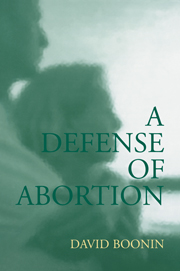1 - Framing the Debate
Published online by Cambridge University Press: 05 June 2012
Summary
OVERVIEW
The moral problem of abortion is difficult because it is unusual. It is unusual both because the human fetus is so unlike other individuals and because the relationship between fetus and pregnant woman is so unlike other relationships. Its unusualness makes it difficult because we are accustomed to settling particular moral disputes by appealing to general moral principles, a procedure that presupposes a substantial degree of similarity between the question we wish to answer and other questions we feel we have, at least tentatively, resolved. As a result, people who find themselves substantially in agreement about what their moral duties to each other are often find themselves not only sharply divided over the problem of abortion, but uncertain about how to bridge the divide.
This feature of the abortion debate can give rise to the impression that the problem cannot be resolved rationally. If what is meant by this claim is that reasonable people will continue to disagree about abortion, then the claim is surely true. But the claim that the abortion controversy cannot be settled rationally is often taken to mean more than this. It is often taken to mean, as one writer has put it, that “each side of the abortion debate has an internally coherent and mutually shared view of the world that is … completely at odds with the world view held by their opponents,” and that “the two sides share almost no common premises” (Luker 1984: 159, 2).
- Type
- Chapter
- Information
- A Defense of Abortion , pp. 1 - 18Publisher: Cambridge University PressPrint publication year: 2002

